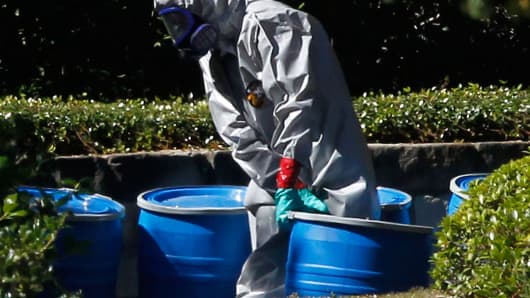As Barack Obama appoints an Ebola czar with renewed efforts to contain the disease, it continues to develop in real time. One can now not escape images of death, destruction, alerts, warnings.
I believe we are at risk of the disease spreading further due to the fact many people are confused by what they are being told. In developing countries, the advice given to avoid the spread of Ebola is not fully understood because it is often only available in western formats and also frequently in written form – pointless in countries where the majority of the population is illiterate.
Read MoreYoshikami: Ebola czar likely to calm hysteria
In the West, the American people were assured for months by global organizations and the government that Ebola would be confined to parts of West Africa. Now concerns have intensified as a seemingly healthy traveler entered the United States and then became sick with Ebola.
The risk is that, as the epidemic spreads, further travel bans are implemented and we start to discriminate unnecessarily. We have already seen the impact of this first hand at the fifth One Young World Summit taking place this week in Dublin. Attended by 1300 young delegates from 190 countries, the Ebola crisis has been one of the key themes of the week with Sir Bob Geldof stating: "They are not dying of this filthy little virus in West Africa. They are dying because unlike in Madrid and Texas, they do not have the doctors and nurses and Medicare. They are dying because they are poor." The delegates held a march in solidarity with the victims of Ebola and handed a petition to implore the United Nations to do more to fight the crisis to its acting director Michael Møller.
Read MoreWe don't need an Ebola czar: Jeffrey Sachs
Communication is crucial to containing this epidemic. Thomas Eric Duncan, the first patient in the U.S. to be diagnosed with Ebola had been sent home from the emergency room of Texas Health Presbyterian Hospital on 25th September because no-one linked his fever to his recent trip to Liberia. Three days later he was diagnosed with Ebola and sadly died. Now nurses who cared for him have traveled on planes in the U.S., worrying many who are now being monitored for any symptoms of the disease.
As Health and Human Services Secretary Silvia Burwell said "we have to communicate, and communicate again and communicate with clarity." The blame game that is now occurring does not help. We have to realize that there is communication and there is effective communication.
Most people do not get their health information from a U.S. government website. They may not know that there's no risk unless there is the exchange of bodily fluids with an infected and contagious Ebola patient.
Read MoreEbola furor erodes trust in the White House
What we need is specific, clear and understandable information that addresses people's real-life questions. Should I be worried? What do I need to do today to protect myself and my family? People should not fear that any fever, pain or cough is the beginning of an Ebola infection. Children cannot catch Ebola from hugging a friend who has been exposed to the Ebola virus. The media's role in disseminating reliable information and allaying fears can be invaluable but comes with a high ethical responsibility.
Anthrax, Mad Cow Disease, H1N1, SARS and HIV/AIDS should have taught us a few lessons. A single credible information source is critical. People need to know who to look to for trustworthy and reliable information – political leaders, no matter how well-intentioned, are not those people.
A central authority point would help to reduce the number of state, county, city and local health departments imposing misguided restrictions at odds with scientific evidence.
Moreover, rather than our typical "boots on the ground" we could help affected countries by assisting governments in how to communicate more effectively with their people – village heads, imams, and traditional healers have the influence needed to drive protective behaviors such as hand washing, and proper burial practices. We should help them get the information they need – this isn't going to happen until we get our own house in order.
It is clear from the disease outbreaks that have occurred in recent years that health increasingly relies on behavior. To modify behavior requires direct, open, understandable and timely information from a single authoritative source, as well as providing intermediaries with the tools they need to reinforce the message. Until that happens I fear many more lives will be needlessly lost.
Commentary by Scott C. Ratzan, MD, a member of the CDC board of scientific counselors on infectious disease. He is also the editor in chief of the Journal of Health Communication and an adjunct professor at Columbia University Mailman School of Public Health. His books include the Mad Cow Crisis: Health and the Public Good and AIDS: Effective Health Communication for the 90s.


